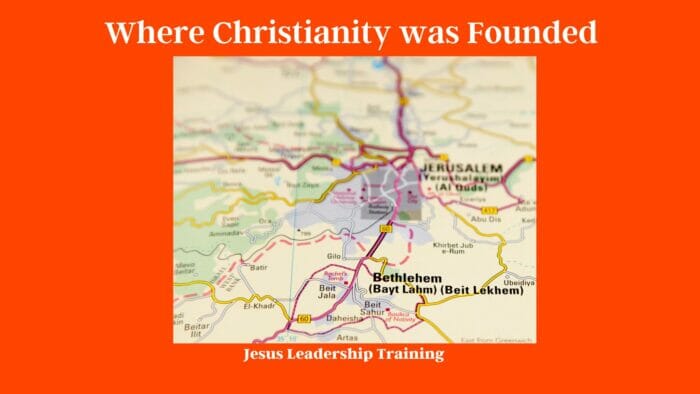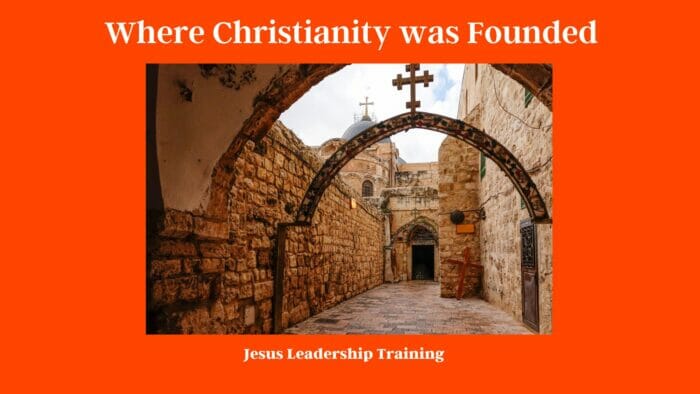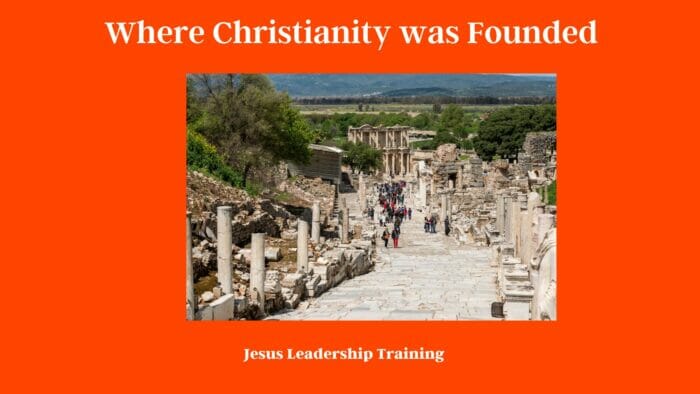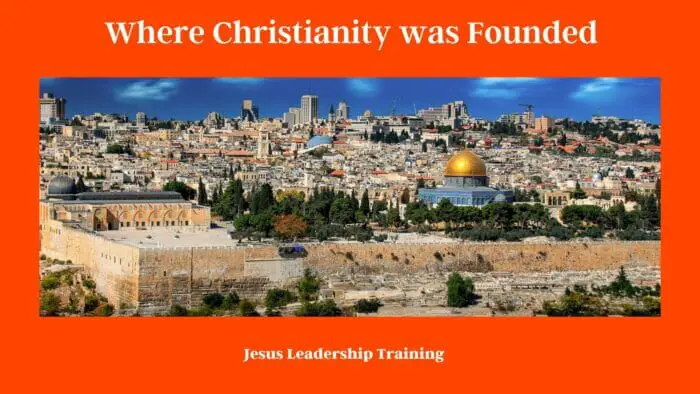Where Christianity was Founded – Christianity was founded in Jerusalem in the early 1st century AD by Jesus of Nazareth, who is believed by Christians to be the Son of God and the Messiah. It quickly spread throughout the Roman Empire and beyond, eventually becoming the world’s largest religion. Today, there are over 2 billion Christians worldwide, with the majority residing in the Americas, Europe, and Africa.
Table of Contents
Where Christianity was Founded
Christianity is one of the world’s major religions, with over two billion followers worldwide. The religion’s origins can be traced back to the Holy Land, a region that encompasses modern-day Israel, Palestine, and parts of Jordan and Lebanon. For many Christians, visiting the Holy Land is a pilgrimage, a journey to the birthplace of their faith.
In this article, we’ll explore the locations where Christianity was founded and their historical significance. From the birthplace of Jesus to the early Christian communities, we’ll discover the rich cultural and religious heritage of the Holy Land.
Where Christianity was Founded: Locations and Significance

Bethlehem: The Birthplace of Jesus
Bethlehem, a town located south of Jerusalem in the West Bank, is the birthplace of Jesus. According to the Bible, Jesus was born in a manger in Bethlehem to Mary and Joseph. Today, the Church of the Nativity in Bethlehem stands on the site believed to be Jesus’ birthplace.
The Church of the Nativity is one of the oldest continuously operating churches in the world, with a history dating back to the 4th century. The church’s interior is adorned with mosaics and frescoes, and visitors can descend into the Grotto of the Nativity, the cave where Jesus was born.
- The Birth of Jesus: This is arguably the most significant event to have ever happened in Bethlehem, as it is the birthplace of Jesus Christ according to the Gospel of Luke. It took place roughly 2000 years ago, and is celebrated around the world every December.
- King David’s Birth: According to the Bible, David, the future King of Israel, was born in Bethlehem around 1000 BC.
- The Slaughter of the Innocents: One of the most tragic events to take place in Bethlehem, this is an event described in the Gospel of Matthew. It is said that King Herod, the ruler of Judea at the time, ordered the massacre of innocent children in Bethlehem, in an attempt to kill Jesus.
- The Return of the Magi: After the birth of Jesus, the Magi, or wise men, returned to Bethlehem to pay homage to the newborn king. The Bible says they were guided by a star and brought gifts of gold, frankincense, and myrrh.
- The Massacre of Bethlehem: In 586 BC, the Babylonian king Nebuchadnezzar II destroyed the city of Bethlehem and slaughtered its citizens in an attempt to quell the rebellious Jews.
- The Construction of the Church of the Nativity: In 326 AD, the Roman Emperor Constantine ordered the construction of the Church of the Nativity in Bethlehem. This is the oldest existing church in the world and was built over the site where Jesus was said to have been born.
Jerusalem: The City of Crucifixion and Resurrection
Jerusalem is the holiest city in Judaism, Islam, and Christianity, and is home to many significant sites for Christians. The city is divided into four quarters: the Jewish Quarter, the Christian Quarter, the Muslim Quarter, and the Armenian Quarter.
The Via Dolorosa, or the Way of Sorrows, is a route in the Old City of Jerusalem that follows the path that Jesus is believed to have taken on the way to his crucifixion. The route ends at the Church of the Holy Sepulchre, which is believed to be the site of Jesus’ crucifixion, burial, and resurrection.

The Church of the Holy Sepulchre is one of the most significant Christian sites in the world, and its history dates back to the 4th century. The church is divided into several chapels and is adorned with intricate mosaics and frescoes. Visitors can also descend into the Tomb of Christ, the site where Jesus is believed to have been buried and resurrected.
- The Conquest of Jerusalem by King David: In 1000 B.C., King David conquered Jerusalem and made it his capital city. He reigned here until his death in 962 B.C. During this time, he built the temple in Jerusalem and unified the Jewish people.
- The Babylonian Exile: In 586 B.C., the Babylonian Empire conquered Jerusalem and destroyed the temple. The Jewish people were exiled to Babylon for 70 years, until Cyrus the Great allowed them to return and rebuild the temple.
- The Maccabean Revolt: In 167 B.C., the Maccabean Revolt began when the Jews revolted against the rule of the Seleucid Empire. After a three-year campaign, the Jews were able to reclaim Jerusalem and the temple was rededicated in 164 B.C.
- The Crucifixion of Jesus: In 33 A.D., Jesus Christ was crucified outside the city walls of Jerusalem. After his death, the Christian religion began to spread throughout the world.
- The Destruction of the Second Temple: In 70 A.D., the Roman Empire destroyed the Second Temple, marking the end of the Jewish state and the beginning of the Jewish diaspora.
- The Muslim Conquest of Jerusalem: In 637 A.D., the Muslim Caliph Umar ibn al-Khattab captured Jerusalem. This marked the beginning of the Islamic era in Jerusalem, which lasted until the Crusades.
- The Crusades: In 1099 A.D., the First Crusade captured Jerusalem from the Muslim forces and established the Latin Kingdom. The city was retaken by Saladin in 1187, but was eventually recaptured by the Crusaders again in 1229.
- The Ottoman Conquest of Jerusalem: In 1517, the Ottoman Empire captured Jerusalem and ruled the city for the next 400 years. During this time, the city was a major center of Jewish, Christian, and Islamic culture.
- The British Mandate of Palestine: In 1917, the British captured Jerusalem from the Ottoman Empire and established the British Mandate of Palestine. This period of British rule lasted until 1948.
- The Establishment of the State of Israel: In 1948, the United Nations declared the establishment of the State of Israel. The city of Jerusalem was divided between Israel and Jordan until 1967, when Israel captured the eastern part of the city.
Nazareth: The Childhood Home of Jesus
Nazareth is a city located in northern Israel and is known as the childhood home of Jesus. According to the Bible, Jesus spent his early years in Nazareth with his parents, Mary and Joseph.
Today, visitors to Nazareth can visit the Basilica of the Annunciation, which is believed to be the site where the angel Gabriel announced to Mary that she would give birth to Jesus. The basilica is one of the largest churches in the Middle East and is adorned with intricate mosaics and artwork.
- The Annunciation: This event is recorded in the Gospel of Luke (1:26–38) and is considered one of the most important events in Christian history. According to Luke, the angel Gabriel appeared to the Virgin Mary in Nazareth and informed her that she was the promised Messiah, and that she would conceive the son of God.
- The Visit of the Magi: Matthew 2:1–12 tells of the visit of the Magi, or wise men, to the infant Jesus in Nazareth, ( or Bethlehem) They brought “gifts of gold, frankincense and myrrh” to the newborn King.
- Jesus’ Early Ministry: Jesus began his ministry in Nazareth, preaching in the synagogue (Luke 4:16–30). Here he declared, “The Spirit of the Lord is upon me, because he has anointed me to preach good news to the poor.”
- The Marriage at Cana: John 2:1–11 tells of the first miracle Jesus performed in Cana, a town near Nazareth. Here, Jesus turned water into wine at a wedding feast.
- The Sermon on the Mount: According to Matthew 5–7, Jesus delivered the famous Sermon on the Mount in the vicinity of Nazareth. In this sermon, he spoke of the Beatitudes and taught the importance of the law.
The history of Christianity is a long and complex one, with the religion’s roots stretching back to the first century AD. In its earliest days, Christianity was a small sect of Judaism, and its followers were mainly centered around Jerusalem. With time, it spread to the Roman Empire and much of the world, becoming an integral part of many societies. It is now the largest religion in the world, with over two billion followers.
Exploring the Origins of Christianity
Christianity is believed to have originated from the teachings of Jesus, a Jewish teacher who lived in the Roman province of Judea. His teachings were first spread by his apostles and followers, who later became known as Christians. The origin of Christianity is closely linked to the Old Testament and the teachings of Judaism, as Jesus himself was Jewish.
How the Religion of Christianity Developed Over Time
Christianity slowly developed into its own religion as more and more people adopted its teachings. It became the official religion of the Roman Empire in the 4th century AD, and from then on its influence spread across Europe, North Africa and the Middle East. It is estimated that by the end of the 4th century, about half of the empire’s population were Christians.
The Early Spread of Christianity and Its Global Impact
The spread of Christianity continued in the centuries after the fall of the Roman Empire. It moved further east and north, and by the 8th century, it had spread to Scandinavia. The Crusades, which took place in the late 11th and early 12th centuries, saw Christianity spread to parts of Asia and the Middle East.
By the 15th and 16th centuries, Christianity had spread to the Americas and other parts of the world. Today, it is estimated that there are over two billion Christians worldwide, making it the largest religion in the world.
Historical Events That Led to the Expansion of Christianity
The spread of Christianity was greatly impacted by a number of historical events. The fall of the Roman Empire, for example, allowed Christianity to spread to new areas of the world and to become more entrenched in existing societies. The Crusades also had a huge impact on the spread of Christianity, as they allowed the religion to move further east and north.
The Reformation of the 16th century was also a major event in the history of Christianity. This movement saw the emergence of Protestantism, which divided the Church into two major branches. This split in the Church allowed Christianity to spread further, as it created a more decentralized system of governance in the Christian world.
The Role of the Early Church in Promoting Christianity
The early Church played an important role in promoting Christianity. It provided a platform for Christian teachings to be shared and discussed, as well as a place for members of the faith to gather and worship. The Church also advocated for the rights of Christians and promoted the faith in many different ways. It was instrumental in the spread of Christianity and its growth in the early centuries of its existence.
Major Figures in Christianity and Their Contributions
There have been many influential figures in the history of Christianity. Jesus himself is the most important figure in the religion, as his teachings form the basis of the faith. The apostles, who were Jesus’s closest followers, were also important in the spread of Christianity. Other influential figures include St. Paul, who wrote many of the letters which became part of the New Testament, and St. Augustine, who is considered to be one of the most important theologians in the history of Christianity.
The Impact of Christianity on Society and Culture
Christianity has had a huge impact on society and culture. It has shaped and influenced many aspects of our lives, from art and literature to politics and economy. It has also been a major force in morality and ethics, as its teachings provide a strong foundation for how we should live our lives. Christianity has also been influential in the development of education, charity and other social institutions.
The Role of the Christian Church in Shaping Society
The Christian Church has played an important role in shaping society. It has provided a platform for Christian teachings to be shared, and through its influence, it has been able to spread its teachings across the world. It has also been involved in many social issues, from poverty to education to health care. It has also been a major force in shaping morality and ethics, as its teachings provide a strong foundation for how we should live our lives.
The Beliefs and Practices of Christianity
Christianity is a religion that is based on the teachings of Jesus. Its core beliefs include the belief in one God, in Jesus as the Son of God, and in the resurrection of Jesus. The Bible is the main source of Christian teachings, and it outlines the faith’s beliefs and practices. These include prayer, worship, attending church and following the Ten Commandments.
The Influence of Christianity on the Modern World
Christianity has had a huge influence on the modern world. Its teachings on morality and ethics have shaped how we view the world, and its influence on art, literature and music has been profound. It has also been a major force in politics and economics, as many of its teachings have shaped how we view and interact with the world.
The Impact of the Bible on Christianity
The Bible is the main source of Christian teachings, and it has had a huge impact on the religion. It provides a foundation for the beliefs and practices of Christianity, and it has been used to spread the faith to different parts of the world. It has also been a source of inspiration for art, literature and music, and it has had a major influence on how we view and interact with the world.
The Role of Christ in the Development of Christianity
Jesus is the most important figure in the history of Christianity, and his teachings form the basis of the faith. His life, death and resurrection are seen as pivotal events in the history of Christianity, and they have shaped the beliefs and practices of the faith. His teachings have also been used to spread Christianity to different parts of the world, and his example of love and forgiveness has been a major influence on how we view the world.
How Technology and Social Media Have Influenced the Spread of Christianity
Technology and social media have had a major influence on the spread of Christianity. Technology has allowed the faith to be shared and discussed more easily, and it has enabled the development of new and innovative ways of spreading the faith. Social media has also been an important tool in the spread of Christianity, as it has allowed people to interact with each other and share their faith with others.
The Challenges Facing Christianity Today
Christianity faces many challenges in the modern world. One of the biggest is the rise of secularism and the increasing acceptance of other faiths and beliefs. This has made it difficult for the Christian Church to maintain its influence and authority in the world, and it has led to a decrease in the number of Christians in some parts of the world. Other challenges include the rise of atheism and skepticism, as well as the changing cultural landscape.
Understanding the Impact of Christianity on Global Politics
Christianity has had a major influence on global politics. Its teachings have shaped how we view the world and interact with each other, and many of its teachings have been used to shape laws and policies. It has also been a major force in the movements for social justice, as it has advocated for the rights of the oppressed and marginalized.
Sea of Galilee: The Site of Jesus’ Miracles
The Sea of Galilee, also known as Lake Kinneret, is a freshwater lake located in northern Israel. The lake is significant for Christians because it is the site where Jesus is believed to have performed many of his miracles, including walking on water and calming the storm.
Today, visitors to the Sea of Galilee can take a boat ride on the lake and visit the Church of the Multiplication of the Loaves and Fishes, which isbelieved to be the site where Jesus performed the miracle of feeding the 5,000 with five loaves of bread and two fish.
Mount of Olives: The Site of Jesus’ Ascension
The Mount of Olives is a hill located east of Jerusalem and is believed to be the site of several significant events in Jesus’ life. According to the Bible, Jesus prayed on the Mount of Olives before his arrest, and it is also the site where he ascended into heaven.
Today, visitors to the Mount of Olives can visit the Chapel of the Ascension, which is believed to mark the site of Jesus’ ascension. The chapel is a small octagonal building with a dome and is adorned with murals and mosaics.
Ephesus: The Site of the Early Christian Community
Ephesus is an ancient Greek city located in modern-day Turkey and was once an important center of early Christianity. The apostle Paul spent several years in Ephesus, and it is believed that the Virgin Mary also lived there.

Today, visitors to Ephesus can visit the ruins of the ancient city, including the Library of Celsus, the Temple of Artemis, and the House of the Virgin Mary. The House of the Virgin Mary is believed to be the house where Mary spent her final years and is a popular pilgrimage site for Christians.
- The Apostle Paul Visited Ephesus: Around 53 AD, the Apostle Paul visited Ephesus during his second missionary journey. He stayed for about three years and preached the gospel to the Ephesians. He also had several confrontations with the silversmiths who were making money from selling idols of the Greek goddess Artemis.
- The Letter to the Ephesians: Around 62 AD, Paul wrote the letter to the Ephesians, which is found in the New Testament. In this letter, Paul encourages the Ephesians to live in unity, love one another, and to serve God faithfully.
- The Riot of the Silver-Smiths: Around 54 AD, the silversmiths in Ephesus rioted because of Paul’s preaching against their idol-making. The riot was eventually quelled by the town authorities.
- John’s Writing of the Book of Revelation: Around 95 AD, the Apostle John wrote the book of Revelation while he was in exile on the island of Patmos. In this book, John reveals the end of the world and the return of Christ.
- The Destruction of the Temple of Artemis: Around 262 AD, the Temple of Artemis in Ephesus was destroyed by a mob of Christian followers. This was a significant event that marked the decline of paganism and the rise of Christianity in Ephesus.
- The Council of Ephesus: Around 431 AD, the Council of Ephesus was convened to discuss the doctrinal issues surrounding the teachings of Nestorius. This council declared Nestorius’ teachings to be heretical and it helped to define the doctrine of the Trinity.
FAQs
Q: Is the Holy Land safe for visitors? A: While the region can be politically and socially volatile, many areas of the Holy Land are safe for visitors. It’s important to research travel advisories and exercise caution when traveling to the region.
Q: Can non-Christians visit the Christian sites in the Holy Land? A: Yes, non-Christians are welcome to visit the Christian sites in the Holy Land.
Q: What is the best time of year to visit the Holy Land? A: The best time to visit the Holy Land is typically in the spring or fall, when the weather is mild and the crowds are smaller.
Final Thoughts – Where was Christianity Founded
The Holy Land is a region of significant cultural and religious importance for Christians. From the birthplace of Jesus to the early Christian communities, the Holy Land is home to many significant sites that tell the story of Christianity’s origins. While the region can be politically and socially complex, it is a destination that is well worth the journey for those looking to connect with their faith and explore the roots of Christianity.
The history of Christianity is a long and complex one, with its roots stretching back to the first century AD. Its influence has shaped many aspects of our lives, from art and literature to politics and economy. It has been a major force in morality and ethics, and its teachings have been used to shape laws and policies across the world. Today, it is estimated that there are over two billion Christians worldwide, making it the largest religion in the world.




